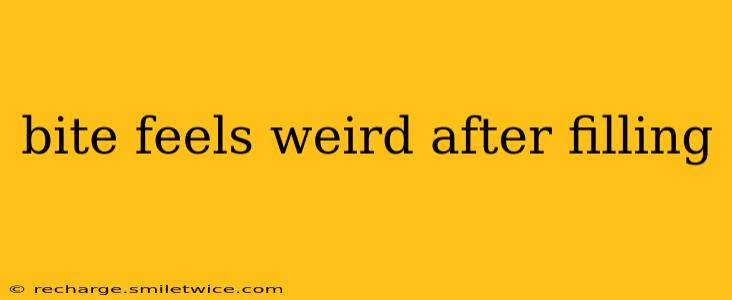A weird feeling after a dental filling is a common concern, and it's important to understand the potential reasons behind it. While many instances are perfectly normal and resolve themselves quickly, others might indicate a more significant issue requiring professional attention. This comprehensive guide explores the various causes, helps you understand what's normal, and advises when to seek help from your dentist.
Why Does My Bite Feel Weird After a Filling?
The most common reason a bite feels strange after a filling is the presence of the filling material itself. Your teeth and jaw need time to adjust to the altered shape and size of the tooth. The new filling might feel slightly higher, lower, or differently textured than the surrounding teeth, leading to a temporary change in your bite. This is often temporary and resolves within a few days to a couple of weeks.
Is a Weird Bite After a Filling Normal?
Yes, to a certain extent. Many people experience a temporary alteration in their bite immediately after a filling. This is usually a mild discomfort, a feeling of slight pressure or unevenness, and not sharp pain. However, it's crucial to distinguish between this normal adjustment period and more serious issues. If the feeling persists for an extended time, worsens, or is accompanied by other symptoms, it warrants a visit to your dentist.
What if the Weird Feeling Doesn't Go Away?
If the strange sensation persists for more than a few weeks, or if you experience:
- Increased pain: Sharp, throbbing, or persistent pain indicates a potential problem.
- Sensitivity to temperature: Extreme sensitivity to hot or cold foods or drinks suggests irritation or infection.
- Jaw pain or clicking: This could indicate temporomandibular joint (TMJ) issues.
- Difficulty chewing or biting: Significant difficulty in biting or chewing signifies a possible problem with the filling or alignment.
It's crucial to contact your dentist immediately. These symptoms could indicate complications such as:
- High filling: A filling that's too high can interfere with your bite and cause pain or discomfort. Your dentist can easily adjust it.
- Occlusal trauma: An uneven bite can put extra stress on your teeth, leading to pain and potential damage.
- Infection: Although less common, an infection can occur under a filling, causing discomfort and requiring treatment.
- Fractured tooth: The filling may be masking a more serious problem like a cracked or fractured tooth.
How Long Does it Take for a Bite to Feel Normal After a Filling?
The time it takes for your bite to feel normal after a filling varies from person to person. For many, the adjustment period is brief, lasting only a few days. However, for others, it can take up to two weeks. Beyond that timeframe, it is advisable to seek professional dental advice.
What Can I Do If My Bite Feels Weird?
In the initial days after getting a filling, some gentle self-care measures can help:
- Soft foods: Stick to softer foods that require less chewing for a few days.
- Over-the-counter pain relief: Nonsteroidal anti-inflammatory drugs (NSAIDs) like ibuprofen can help manage mild discomfort.
- Rinsing: Gently rinse your mouth with saltwater to keep the area clean.
However, these measures are only temporary solutions. If the weird feeling persists or worsens, professional dental care is necessary.
When Should I Call My Dentist About a Filling?
If the discomfort is more than mild, or if you experience any of the symptoms mentioned earlier (increased pain, sensitivity, jaw pain, etc.), contact your dentist immediately. Early intervention can prevent more significant issues and ensure your oral health is well-maintained.
This information is for general knowledge and does not substitute professional dental advice. Always consult your dentist for diagnosis and treatment of any dental concerns.
